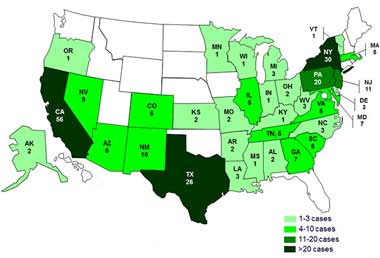Six ongoing Salmonella outbreaks that have sickened a total of 248 people in 34 states have been linked to illegal pet turtles, according to the Centers for Disease Control and Prevention (CDC). Almost 70 percent of those who became ill were children under the age of 10.
It is precisely because of Salmonella risk , especially to young children, that the Food and Drug Administration banned the sale and distribution of small turtles as pets in 1975. Turtles with shells shorter four inches should not be purchased as pets or given as gifts.
Salmonella is a bacteria that can make people sick if ingested. Turtles and other reptiles and amphibians can have Salmonella on their bodies even if they appear healthy and clean. The germs can also get on everything they have contact with including aquariums, water, and other habitats. Symptoms of Salmonella poisoning include, diarrhea, vomiting, fever, and/or abdominal cramps. In some cases, people can become so sick they require hospitalization. Of the 248 people who have been sickened by these outbreaks, 41 have been hospitalized.
The first outbreak, which began in August, was caused by Salmonella Sandiego Stain A and Salmonella Newport Strain A. It sickened 84 people in 15 states. The second outbreak began in December and sickened 18 people in 11 states with Salmonella Pomona, strain A. The third outbreak began in October 2011 and lated a year. It sickened 33 people in 17 states with Salmonella Pomona, strain A, The fourth outbreak began in February and infected seven people in three states with Salmonella Pomona. Outbreak Five sickend 85 people in 23 states with Salmonella Pomona, strain B. And Outbreak Six sickened 21 individuals with Salmonella Pomona, strain B in five states.




